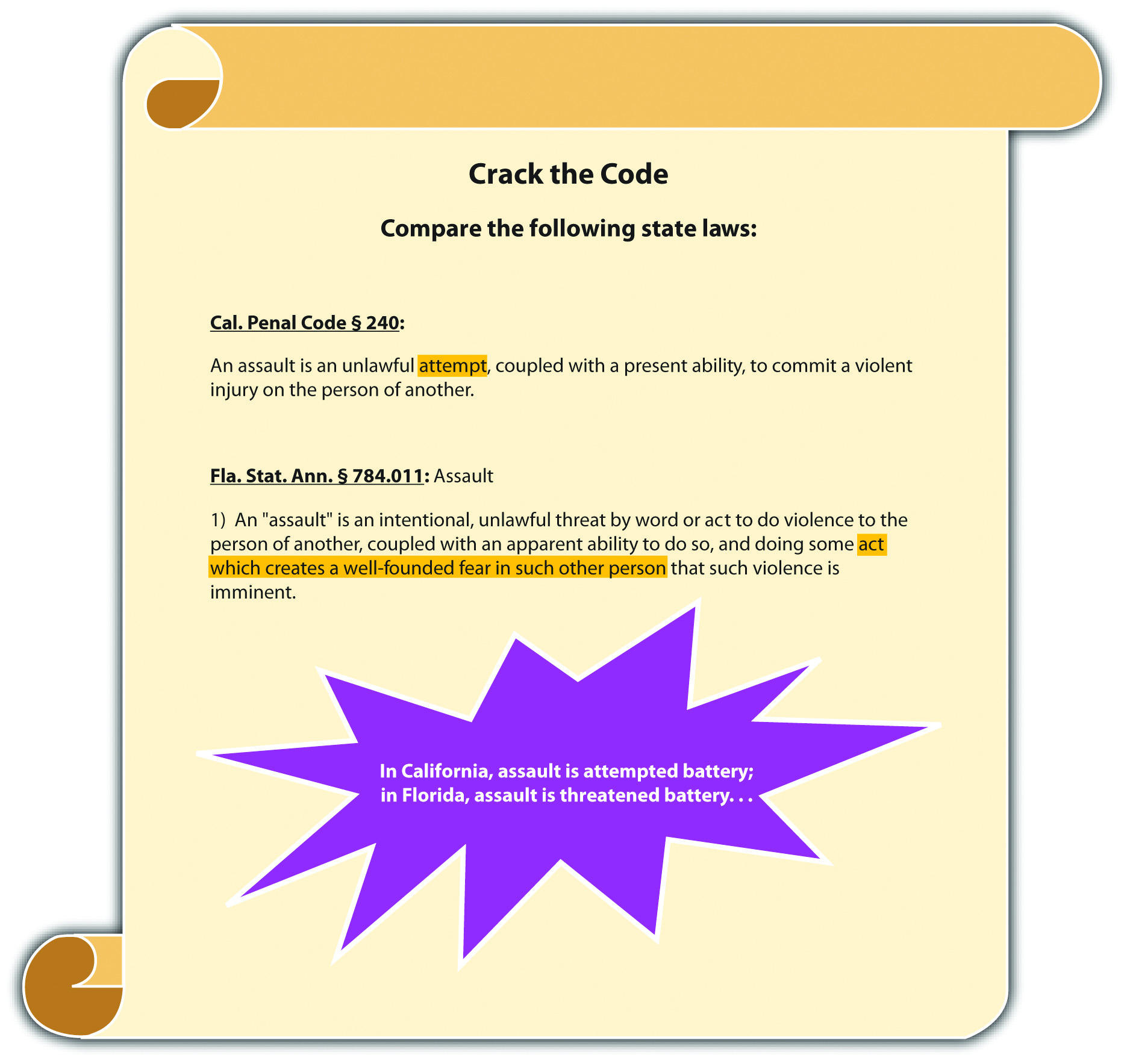Physical Assault Definition - This article is about the criminal offense. For the traumatic aspects of assault, see assault (harm). For other uses, see Assault (disambiguation).
Assault is committing unlawful bodily harm or unwanted physical contact with a person or, in some specific legal definitions, threatening or attempting to commit such an act.
Physical Assault Definition

It is both a crime and a tort and can therefore result in criminal prosecution, civil liability or both. Literally, the common law definition is the same as in criminal law and tort law.
Defining Assault & Battery In Texas
Traditionally, common law legal systems have had separate definitions of assault and injury. When this distinction is made, battery refers to actual physical contact, while assault refers to a credible threat or attempt to cause battery. Some jurisdictions have combined the two offenses into one offense called "assault and battery", commonly referred to as "assault". As a result, in many of these jurisdictions, assault has taken on a definition more consistent with the traditional definition of battery. The legal systems of civil law and Scots law have never distinguished between assault and injury.
Legal systems literally recognize that attacks can vary greatly in severity. In the United States, assault can be charged as a misdemeanor or misdemeanor. In Gland, Wales and Australia, she can be charged with common assault or assault with actual bodily harm (ABH) or grievous bodily harm (GBH). Canada also has a three-tier system: assault, assault with bodily harm, and aggravated assault. There are usually separate charges of sexual assault, brawling and assault on a police officer. Violence can overlap with attempted crime; For example, assault can be charged as attempted murder if it is done with intent to kill.
In jurisdictions that distinguish between the two, assault usually accompanies beating if the attacker both threatens to make unwanted contact and continues with that threat. See joint attack. battery components is that it is a voluntary act,
Made for the purpose of causing harmful or offensive contact with another person or under circumstances which make such contact substantially certain to cause such contact.
Time To Get Serious About Domestic Violence In Hong Kong By Strengthening The Law
Aggravated assault may also be charged in cases of attempted harm to police officers or other public officials.
While the exact scope and application of defenses varies in different jurisdictions, the following provides a list of concepts that may apply to all levels of attack:
There are exceptions to cover unwanted physical contact that amounts to normal social behavior known as minimal harm. Assault may also be considered in cases of spitting or unwanted exposure to bodily fluids of others.

Const can be full or partial defense against attack. In some jurisdictions, especially the gland, it is not a defense if the degree of injury is severe as long as there is no legally identifiable valid reason for the attack.
Simple Assault In New Jersey
This can have important implications in issues such as consensual sadomasochistic sexuality, particularly the case of Spanner's surgery. Legally recognized good reasons for constructions include surgery, activities within the rules of the game (mixed martial arts, wrestling, boxing or contact sports), physical adornment (R v Wilson [1996] Crim LR 573), or Playing Horses (R v Wilson [1996] Crim LR 573) Jones [1987] Crime LR 123). However, any activity that falls outside the rules is not legally recognized as a defense of steadfastness. In Scots law, const is not considered a defense against assault.
Police officers and court officers have general authority to use force for the purpose of arrest or in the effective performance of their official duties. For example, a bailiff who takes possession of the goods by court order may use force if this is reasonably necessary.
In some jurisdictions, such as Singapore, judicial corporal punishment is part of the legal system. Officers administering the sentence are immune from prosecution for assault.
In the United States, United Kingdom, Australia and Canada, physical punishment of children by them or their legal guardian is not legally considered sexual assault unless it is considered excessive or unreasonable. What constitutes "reasonable" varies both in law and case law. Unreasonable corporal punishment can be charged as sexual assault or under a separate child abuse law.
What Is Sexual Assault (and What Isn't), According To The Law
Many countries, including some US states, allow the use of corporal punishment on children in school. In English law, S. 58 The Child Act 2004 limits the availability of remedies for public abuse under s. 39 Criminal Law Act 1988.
This may or may not involve self-defense, in that using a reasonable degree of force to prevent another person from committing a crime may lead to an attack being directed, but it may prevail over a crime involving no use is made of personal abuse. .
Some jurisdictions permit the use of force in defense of property, to prevent harm, either in itself or under one or both of the foregoing categories of defense, where threatening or attempting to damage property may be considered an felony (in English law), under Section 5 of the Criminal Damages Act 1971, the defender can be said to have a legal excuse to damage property while defending and defending under Section 3 of the Criminal Code 1967) given the need to deter guards and excessive self-help. In addition, some jurisdictions, such as Ohio, allow homeowners to use force in evicting an intruder. The rest just have to confirm to the court that they felt threatened by the intruder.

These are the countries with the highest number of assault cases according to the United Nations in 2018.
Why Slapping Someone Is Considered Assault
The term "attack", used in legislation, generally refers to both assault and regular battery, although the two definitions remain different. Common assault includes intentionally or recklessly causing arrest of someone solely for inflicting unlawful force, while battery refers to the actual use of force.
Each state has laws regarding the act of assault, and offenses against the act that constitute assault are heard in that state's magistrates court or the offenders are heard in a circuit or superior court for that state. The legislation that defines sexual assault for each state determines what elements constitute sexual assault, where sexual assault is divided into criminal statutes or statutes, and the provisions that apply to the crime of sexual assault.
Defines a group of attacks that are more severe than the regular attack and draw a heavier taste. These include:
There is a wide variety of attack types that can occur. In general, assault occurs when someone directly or indirectly exerts violence on another person without their own strength. It can also occur when someone attempts, or threatens to use, such violence without the other's fortitude. No injury needs to have occurred to commit the attack, but the force used in the attack must be of an offensive nature with the intent to use force. It may be an attack to 'click', 'press', 'push' or direct such a simple action at another person, but the unlawful use of force is not an attack.
In Service Personal Assault And Ptsd
The harsh punishment for assault in Canada varies depending on how the charge is passed through the justice system and the type of assault committed. The Criminal Code defines assault as a double act (punishment or interim injunction). Police officers can arrest anyone without a warrant if it is in the public interest to do so despite Section 495(2)(d) of the Act.
This public interest is usually satisfied by prioritizing the continuation or repetition of the process over the same victim.
No one should be involved in assault with a weapon, assault involving bodily harm, aggravated assault, or any form of assault. A const is also withdrawn if two people continue to fight but intentionally cause grievous bodily harm (R v Paice; R v Jobidon). No one can be seriously injured.

Attack in ancient Greece was commonly referred to as arrogance. Contrary to modern usage, the term did not carry an elaborate connotation of excessive pride, self-confidence or arrogance, which often led to the death penalty. In Ancit Greece, "arrogance" referred to actions that, internally or otherwise, shame and humiliate both the victim and the repeat offender. This was reflected in the public and private actions of the rich and powerful.
Education Exchange Corps: Missouri Assault Law: New Definition Of Physical Injury Makes It Harder To Prove
Violations of the law against arrogance include what today might be called assault and battery; sex offenses ranging from the forced rape of a woman or child to consensual but indecent sex; or theft of public or sacred property.
Two well-known instances are found in the speeches of Demostes, a prominent statesman and orator of ancient Greece. These two cases took place, the first, as well as other acts of violence, in which Medias allegedly punched Demostes in the face in the theater (against Medeas), and the second (against Conon), in which the defender allegedly beat him severely.
Hubris, though not specifically defined, was a legal term and was considered a crime in classical times. It was also considered the greatest sin in the ancient Greek world. It was like that
Physical assault charges, physical assault law, non physical assault, assault physical, dealing with physical assault, punishment for physical assault, reporting physical assault, physical assault attorneys, definition of physical assault, ptsd after physical assault, physical assault at work, physical assault workplace
0 Comments